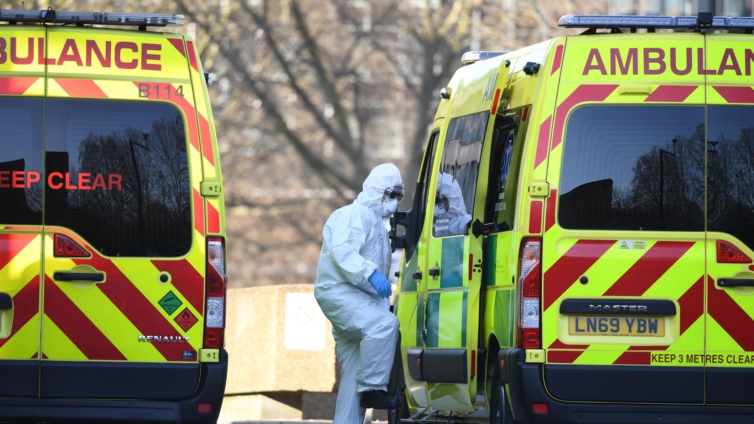A senior NHS figure has cast doubt on the service's ambition to continue treating all patients with other illnesses throughout the second wave of the coronavirus pandemic.
Professor Stephen Powis, NHS England's national medical director, told Sky News the National Health Service was "not running out of capacity" and it was able to "treat everyone it needed to treat", but local decisions on treatment would have to be made if the situation changed.
His comments come as the North West Ambulance Service was forced to declare a major incident and ask people only to call them with life-threatening concerns.
The NHS was told to stop all non-urgent operations in April this year to create capacity to deal with the first wave of infections. Professor Powis said this time all treatments should continue uninterrupted.
"There are two key differences this time. Firstly, we are keeping elective care going all the time. We didn't do that in April because the virus was coming at us very quickly and we needed to create capacity," he said.
"This winter we are intent on keeping that going and of course we are heading into winter rather than heading out of winter. So in addition to COVID, we will be seeing all the other infections we get over the winter."
The decision, Professor Powis said, to pause elective care would be made locally by trusts.
He said: "In those areas of the country where infection rates are highest, clearly there is the most pressure on NHS beds. And unfortunately some trusts have had to take short-term decisions to step down some elective care.
"Of course, we have much more information locally because of testing, so NHS organisations can do that much better and help each other out."
Nicki Credland, chair of the British Association of Critical Care Nurses, said the ambition of maintaining all elective care through the autumn in the face of rising infections is not realistic and more trusts will be forced to cancel non-urgent operations.
She said: "Maintaining elective work for the NHS is really important in terms of the health of the nation.
"Nobody, no nurse, no doctor within the NHS would ever want patients to be suffering because they can't access the NHS for routine treatment.
"However, we do need to understand that the NHS is not an infinite resource we have a set amount of staff we can work with. And those staff have to manage a massively increasing volume of patients.
"Certainly in the north of England at the moment they are seeing huge volumes of admissions.
"It is simply not possible for those staff to be in two places at once.
"So to protect the safety of patients and to protect the safety of our staff we have no alternative other than to think about how can we remove workload to one area to redirect that to manage increasing need in the other.
"And the way we can do that is to reduce elective surgeries."
Latest Stories
-
Minority slams ‘unlawful’ dismissal of Bank of Ghana staff, demands immediate reinstatement
3 minutes -
Ghana launches PANAFEST & Emancipation Day 2025 in Accra
6 minutes -
Speaker allows presentation of SC vetting report despite Minority objections
15 minutes -
‘We’re getting ready to win and we’ll win well’ – Bryan Acheampong’s team
19 minutes -
NPP race: Bryan Acheampong is spiritually fortified against fear and intimidation – Appiah-Kubi
28 minutes -
NPP Primary: Bryan Acheampong has the experience to outshine contenders – Appiah-Kubi
42 minutes -
Bryan Acheampong campaign team member, urges Chairman Wontumi to reciprocate support
45 minutes -
Ghana could reclaim $4 million from solar waste with proper recycling – KNUST Study finds
51 minutes -
Focus on electability, not endorsements – Political analyst urges NPP delegates
58 minutes -
Trump shares message from Nato chief praising ‘decisive action’ in Iran
1 hour -
Water supply improves in Bongo town, but fluoride concerns persist
1 hour -
New LI in the offing to make disability inclusion mandatory – Dr Apaak
1 hour -
Endorsements don’t always equate to actual votes, says Bryan Acheampong’s camp
1 hour -
University of Ghana issues COVID-19 resurgence alert
1 hour -
Pastor accused of withdrawing cash from dead friend’s account faces court
1 hour

